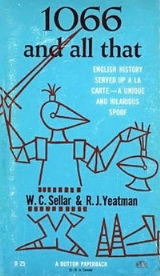
. Written by W. C. Sellar
and R. J. Yeatman
and illustrated by John Reynolds
, it first appeared serially in Punch magazine, and was published in book
form by Methuen & Co. Ltd.
in 1930.
The book is a parody
of the Whiggish
style of history
teaching in English
schools at the time, in particular of Our Island Story
.
Noticing some fair-haired children in the slave market one morning, Pope Gregory, the memorable pope, said (in Latin), 'What are those?' and on being told that they were Angels, made the memorable joke – ' Non Angli, sed Angeli ' (' not Angels, but Anglicans ') and commanded one of his saints called St Augustine to go and convert the rest.![]()
N.B. – Do not attempt to answer more than one question at a time.![]()
William next invented a system according to which everybody had to belong to someone else, and everybody else to the King. This was called the Feutile System, ...![]()
Simon de Montfort's Good IdeaSimon de Montfort's Idea was to make the Parliament more Representative by inviting one or two vergers, or vergesses, to come from every parish, thus causing the only Good Parliament in History.![]()
Henry VII was very good at answering the Irish Question, and made a Law called Poyning's Law by which the Irish could have a Parliament of their own, but the English were to pass all the Acts in it. This was obviously a very Good Thing.![]()
Shortly after this the cruel Queen died and a post-mortem examination revealed the word 'CALLOUS' engraved on her heart.![]()
With the ascension of Charles I to the throne we come at last to the Central Period of English History (not to be confused with the Middle Ages, of course), consisting in the utterly memorable Struggle between the Cavaliers (Wrong but Wromantic) and the Roundheads (Right and Repulsive).![]()
The Rebels were ferociously dealt with by the memorable Judge Jeffreys who was sent out by James as a Justice in Ire in the West, where he made some furious remarks about the prisoners, known as 'The Bloody Asides'.![]()
Williamanmary: England Ruled by an Orange![]()
Gladstone .. spent his declining years trying to guess the answer to the Irish Question; unfortunately, whenever he was getting warm, the Irish secretly changed the Question, ...![]()

